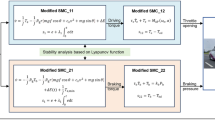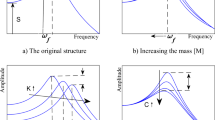Abstract
In order to describe and solve chaotic yawing in straight-line navigation, taking large tanker Davis Sea as an example, the yawing model and corresponding high-gain adaptive controller is established. Chaotic yawing is proved to exist. Mathematical analysis indicates the error of the controlled system is globally ultimately bounded. Simulation results show the proposed control law is effective and robust to model perturbation. Compared with sliding mode control, the accuracy of proposed method is 69.9% better and the control energy consumption is 32.6% smaller.







Similar content being viewed by others
Data availability
Data available on request from the authors.
References
Su N (1996) Chaos and ship motion control. Dalian Maritime University, Dalian
Zhu L (2009) Chaos in the course keeping control of ships and robust control method. Dalian Maritime University, Dalian
Bi N (2009) Robust Control of Parameter Uncertain Liu Chaotic System. Dalian Maritime University, Dalian
Gennaretti M et al (2017) Assessment of helicopter pilot-in-the-loop models. Int J Aerospace Eng 2017:1–14
Xu S et al (2017) Review of control models for human pilot behavior. Annu Rev Control 44:274–291
Gritli H, Belghith S (2017) Walking dynamics of the passive compass-gait model under OGY-based state-feedback control: Analysis of local bifurcations via the hybrid Poincaré map. Chaos, Solitons Fractals 98:72–87
Pyragas V, Pyragas K (2018) Act-and-wait time-delayed feedback control of autonomous systems. Phys Lett A 382(8):574–580
Yin C, Zhong S, Chen W (2012) Design of sliding mode controller for a class of fractional-order chaotic systems. Commun Nonlinear Sci Numer Simul 17(1):356–366
Kobravi H, Erfanian A (2009) A decentralized adaptive robust method for chaos control. Chaos Interdisciplinary J Nonlinear Sci 19(3):33–111
Awrejcewicz J, Pyryev Y (2006) Chaos prediction in the duffing-type system with friction using Melnikov’s function. Nonlinear Anal Real World Appl 7(1):12–24
Xie J, Ren B, Liu Z et al (2016) Controlling Chaos of Planar Closed Chain Underactuated Mechanism with the Edge of Chao. Amer Soc Mechanical Engineers, New York
Zhang Z, Liu Y, Sieber J (2020) Calculating the Lyapunov exponents of a piecewise-smooth soft impacting system with a time-delayed feedback controller. Commun Nonlinear Sci Numerical Simulation 91:105451
Ahrabi AR, Kobravi HR (2019) A chaos to chaos control approach for controlling the chaotic dynamical systems using Hamilton energy feedback and fuzzy-logic system. Chaos 29(7):3
Panikhom S (2017) IEEE. Implementation of Chaos Control in Chua’s Circuit via Sliding Mode Control. 2017 International Electrical Engineering Congress. New York; Ieee
Abtahi SM (2019) Suppression of chaotic vibrations in suspension system of vehicle dynamics using chattering-free optimal sliding mode control. J Braz Soc Mech Sci Eng 41(5):10
Capeans R, Sabuco J, Sanjuan MAF (2018) Partial control of chaos: how to avoid undesirable behaviors with small controls in presence of noise. Discrete Contin Dyn Syst-Ser B 23(8):3237
Wei XJ, Li NZ, Ding WC et al (2018) Model-free chaos control based on AHGSA for a vibro-impact system. Nonlinear Dyn 94(2):45–55
Li T, et al (2015) A valid adaptive sliding mode control method for chaotic ship steering. In: The 27th Chinese Control and Decision Conference (2015 CCDC)
Jiang ZP (2002) Advanced feedback control of the chaotic duffing equation. Ieee Transactions on Circuits And Systems I-Fundamental Theory And Applications 49(2):2-9
Guo K, Jiang J, Xu Y (2020) Model predictive path integral method for nonlinear random vibration control. J Xidian University 47(4):48–54
Peitz S, Otto SE, Rowley CW (2020) Data-driven model predictive control using interpolated Koopman generators. SIAM J Appl Dyn Syst 19(3):16–28
Tsypkin YZ, Polyak BT (1999) High-gain robust control. Eur J Control 5(1):3–9
Ilchmann A, Ryan EP (2004) On tracking and disturbance rejection by adaptive control. Syst Control Lett 52(2):137–147
Assabaa C et al (2013) Fractional order adaptive controller for stabilised systems via high-gain feedback. IET Control Theory Appl 7(6):822–828
Asuma M, Toda M (2018) A high-gain observer-based approach to robust motion control of towed underwater vehicles. IEEE J Oceanic Eng 44(4):997–1010
Petráš I (2011) Fractional-order chaotic systems. In: Fractional-order nonlinear systems: modeling, analysis and simulation. Springer Berlin Heidelberg: Berlin, Heidelberg. p. 103–184.
Zhang X, Jin Y (2013) Control system modeling and digital simulation, 2nd edn. Dalian Maritime University Press, Dalian, pp 103–117
Hollar D (2018) Jacobian Matrices and Lyapunov Exponents. Springer International Publishing, Cham, pp 163–178. https://doi.org/10.1007/978-3-319-59626-6_12
Mañosa V, Ikhouane F, Rodellar J (2005) Control of uncertain non-linear systems via adaptive backstepping. J Sound Vib 280(3):657–680
Liu J (2012) Sliding Mode Control Design and MATLAB Simulation, 2nd edn. Tsinghua University Press, Beijing
Acknowledgements
This work is partially supported by the National Natural Science Foundation of China (Grant No.51679024 and 51779029), Cultivation Program for the Excellent Doctoral Dissertation of Dalian Maritime University (2022YBPY001). The authors would like to thank anonymous reviewers for their valuable comments to improve the quality of this article.
Author information
Authors and Affiliations
Corresponding author
Additional information
Publisher's Note
Springer Nature remains neutral with regard to jurisdictional claims in published maps and institutional affiliations.
About this article
Cite this article
Han, X., Zhang, X. Modelling and high-gain adaptive control of chaotic yawing of ship under wave disturbance. J Mar Sci Technol 29, 75–82 (2024). https://doi.org/10.1007/s00773-023-00970-5
Received:
Accepted:
Published:
Issue Date:
DOI: https://doi.org/10.1007/s00773-023-00970-5




